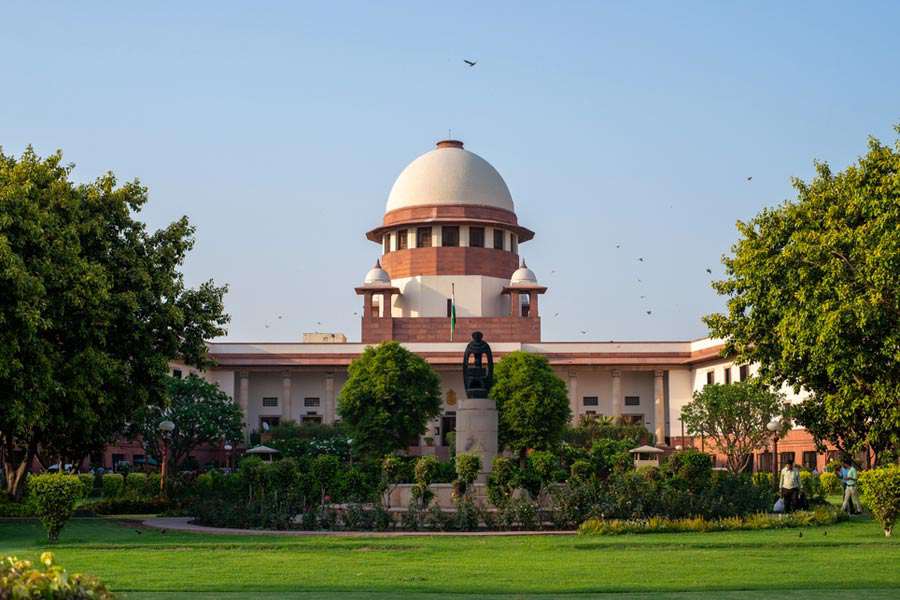Courts cannot convict an accused and acquit the other when there is identical evidence ascribing same or similar role, the Supreme Court has said while acquitting four people who were sentenced to 10 years in jail for alleged offences including dacoity with murder.
The apex court said in such a matter where evidence is identical, the cases of both the accused will be governed by the "principle of parity", which means the courts cannot make a distinction between the two as it will amount to discrimination.
A bench comprising Justices Abhay S Oka and Sanjay Karol acquitted one of the accused while recalling the top court's May 11, 2018 order that had summarily dismissed his plea challenging a Gujarat High Court verdict.
The high court had confirmed the conviction of seven accused in the case but reduced the sentence from life term to 10 years.
The apex court also set aside the conviction of two accused, who had not preferred any appeal against the high court verdict, noting that "suo motu exercise of powers under Article 136 is warranted" as it was a question of their liberty guaranteed by Article 21 of the Constitution.
While Article 136 of the Constitution deals with the power of the apex court to grant special leave to appeal in cases, Article 21 pertains to protection of life and personal liberty.
The bench noted the apex court had acquitted three accused in August 2018, while the plea by another accused was dismissed in May 2018.
It delivered its verdict while dealing with the appeal filed by Javed Shaukat Ali Qureshi against the high court verdict.
"When there is similar or identical evidence of eyewitnesses against two accused by ascribing them the same or similar role, the court cannot convict one accused and acquit the other. In such a case, the cases of both the accused will be governed by the principle of parity," the apex court said in its verdict delivered on Wednesday.
"This principle means that the criminal court should decide like cases alike, and in such cases, the court cannot make a distinction between the two accused, which will amount to discrimination," it said.
Dealing with the case of Qureshi, the bench noted that two prosecution witnesses, who were claimed to be the eye-witnesses, were police constables and had claimed that a mob of around 1,000 to 1,500 people had gathered at the spot in Ahmedabad when the incident took place in November 2003.
The bench said the conviction of other three accused, who were later acquitted by the apex court, was based on the testimonies of these two constables.
It said once a coordinate bench of the top court had discarded their testimony in its entirety being unreliable, the benefit of the finding will have to be extended to the other similarly placed accused.
"Therefore, we have no manner of doubt that the benefit which is granted to accused nos. 1,5 and 13 (who were acquitted by SC) deserves to be extended to accused nos. 3 and 4, who did not challenge the judgment of the high court," it said. "In this case, the suo motu exercise of powers under Article 136 is warranted as it is a question of the liberty of the said two accused guaranteed by Article 21 of the Constitution," the bench said.
It said case of one of the accused, whose plea was earlier dismissed, stands on the same footing as the other three who were acquitted by the apex court.
The bench said if it fails to grant relief to him, it will amount to doing "manifest injustice".
"In fact, as a constitutional court entrusted with the duty of upholding fundamental rights guaranteed under the Constitution, it is our duty and obligation to extend the same relief to accused no.2," it said.
While allowing the appeal, the bench acquitted Qureshi by setting aside the March 2006 judgement of the trial court as well as the February 2016 verdict of the high court.
It also acquitted Mehboobkhan Allarakha and Saidkhan, who had not preferred any appeal against the high court verdict.
"We recall the order dated May 11, 2018… and grant leave," the bench said while acquitting Amjadkhan Nasirkhan Pathan in the case.
Except for the headline, this story has not been edited by The Telegraph Online staff and has been published from a syndicated feed.










